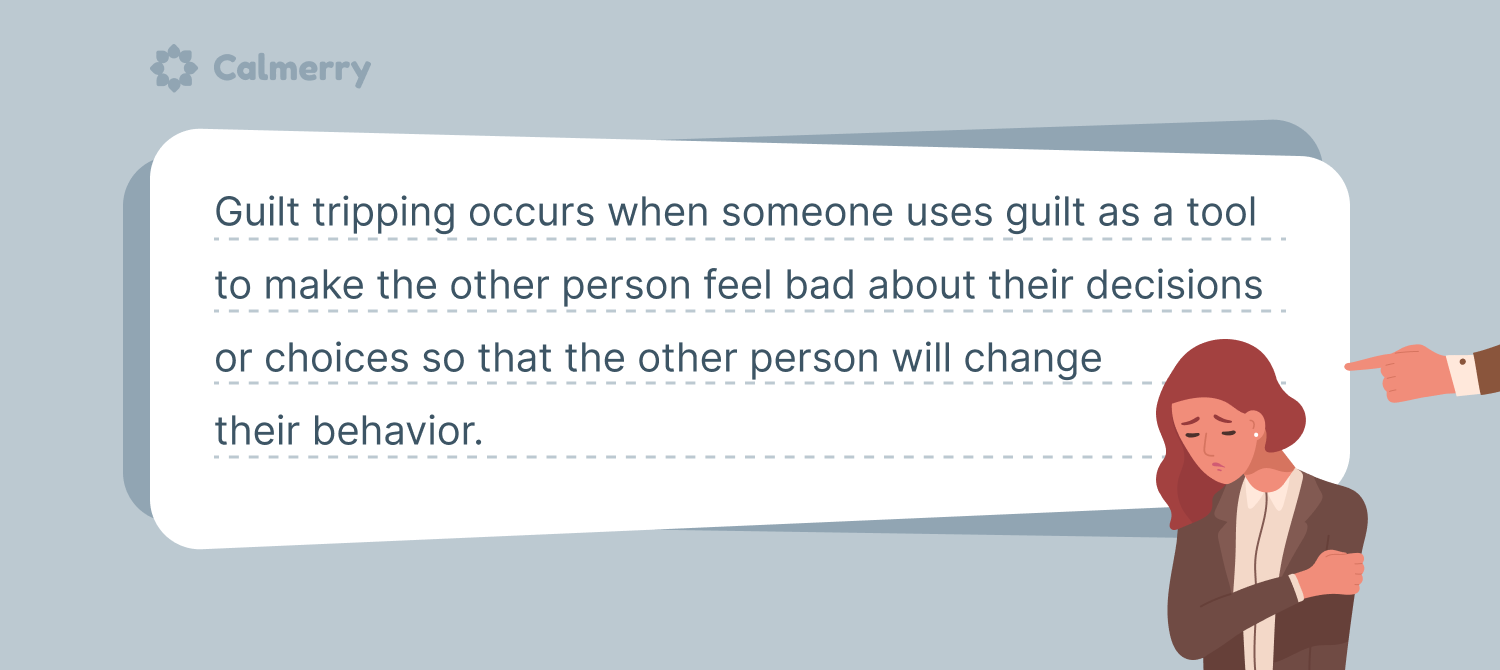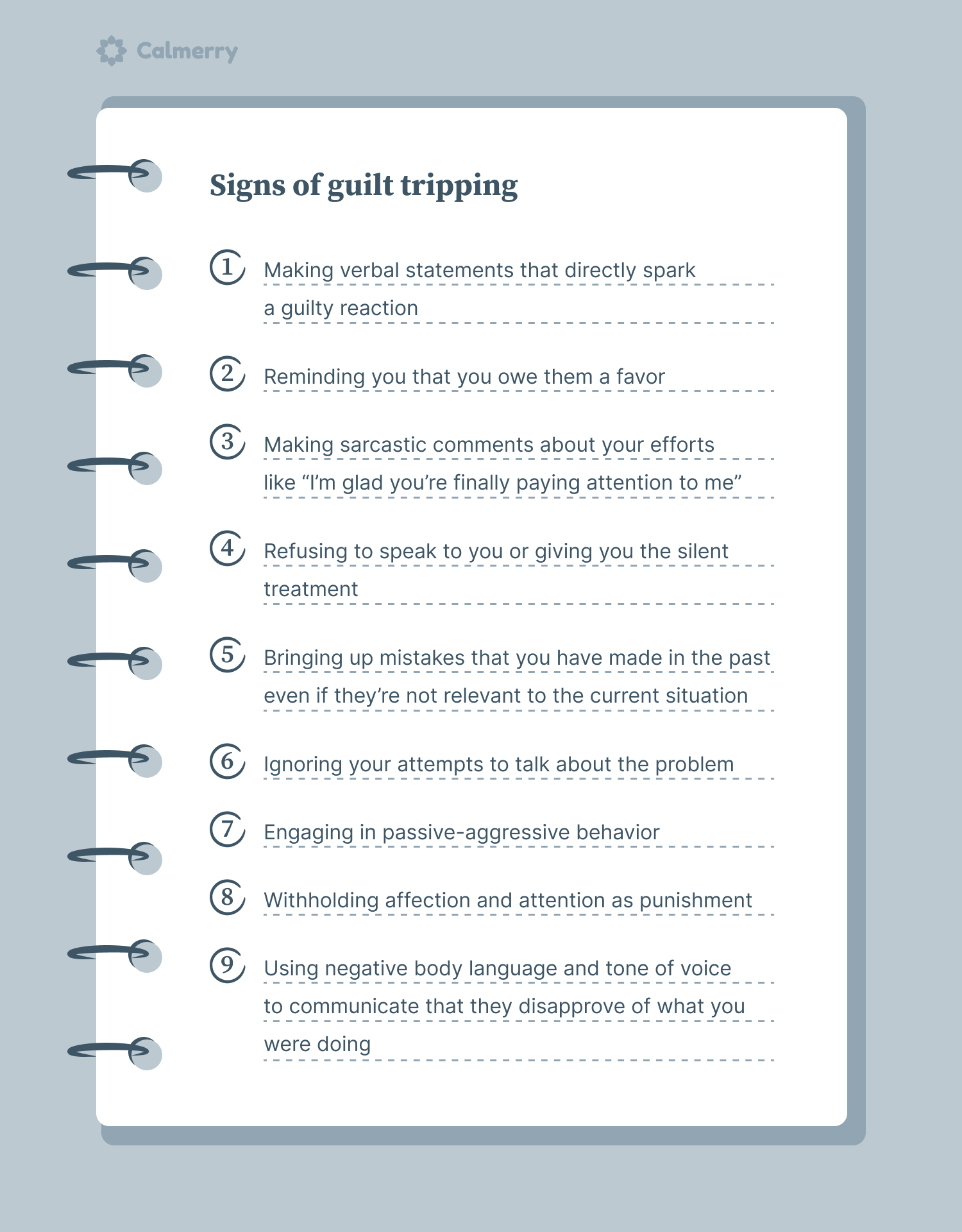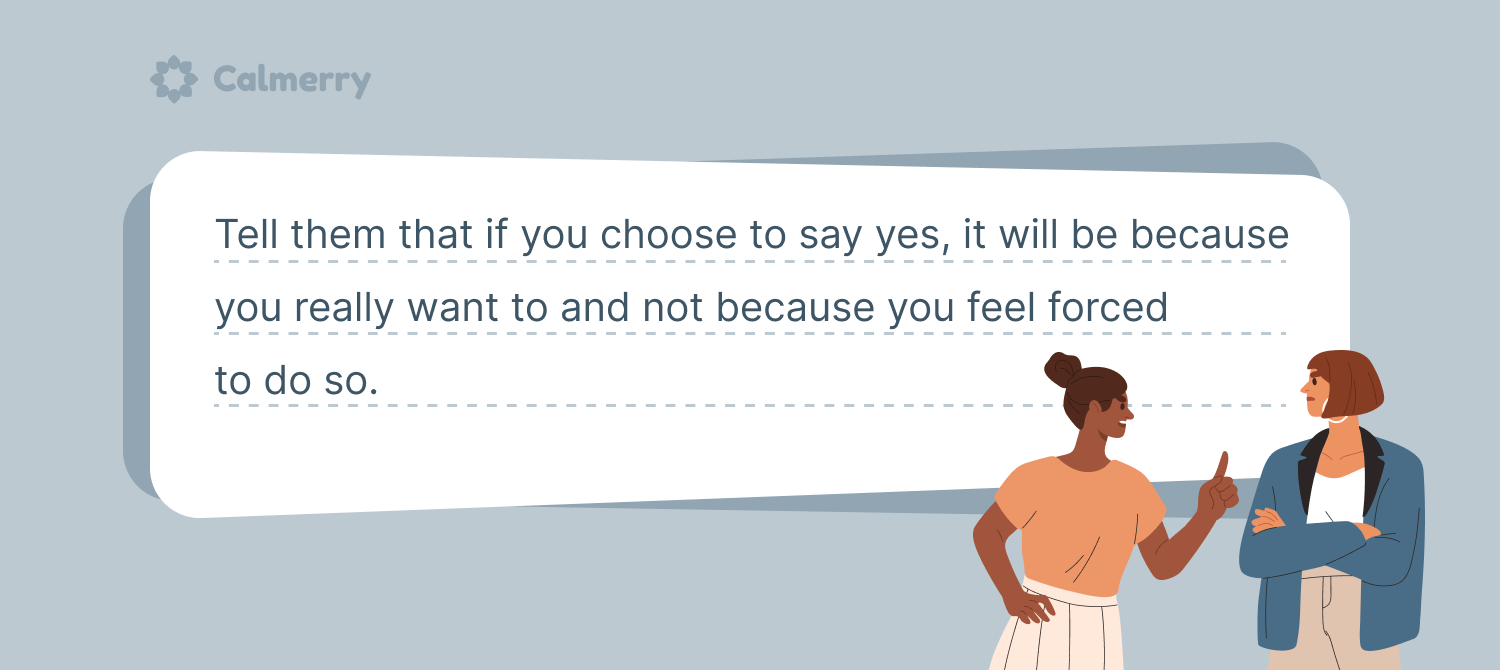What Is Guilt-Tripping in Relationships?

In this article
Has someone ever tried to make you feel bad about something you did or didn’t do to get you to do something for them? Then you may have been a victim of guilt-tripping. It’s a manipulation tactic that is not uncommon, and many people use it to get their way in their relationships.
What is guilt-tripping?
Guilt tripping can be defined as psychological manipulation that involves making someone feel guilty for something rather than directly expressing displeasure to get them to do something. It’s a form of classic passive-aggressive behavior that indicates a person’s inability or unwillingness to communicate their needs or feelings openly, honestly, and assertively.
Such behaviors often show up across relationships marked by close emotional connections, from romantic to parent-child relationships to friendships, and can even be seen in the workplace between bosses or co-workers. Guilt tripping occurs when someone uses guilt as a tool to make the other person feel bad about their decisions or choices so that the other person will change their behavior.

People may use this tactic to express frustration, insecurity, fear, hurt, or annoyance when something prevents them from saying exactly how they feel. Often, people use guilt-tripping subconsciously or consciously as the easiest option compared to being vulnerable in communication and expressing their needs and feelings directly.
Intentional or not, guilt-tripping can be effective in getting others to behave in a certain way simply because we don’t want to disappoint important people in our lives, but it’s unlikely to lead to a healthy relationship. This tactic prevents healthy communication and conflict resolution and often provokes strong feelings of resentment toward the manipulator. But unfortunately, most guilt trippers rarely consider the long-term impact of their actions.
Signs of guilt-tripping
Guilt tripping works by making other people feel bad about themselves and may take many forms, from criticism to playing the victim to “cold shoulder.” Sometimes such behavior can be obvious, but it can also be much more subtle and difficult to recognize.
Here are some warning signs that someone might be trying to guilt-trip you:
- Making verbal statements that directly spark a guilty reaction
- Reminding you that you owe them a favor
- Making sarcastic comments about your efforts like “I’m glad you’re finally paying attention to me”
- Refusing to speak to you or giving you the silent treatment
- Bringing up mistakes that you have made in the past, even if they’re not relevant to the current situation
- Ignoring your attempts to talk about the problem
- Engaging in passive-aggressive behavior
- Withholding affection and attention as punishment
- Using negative body language and tone of voice to communicate that they disapprove of what you were doing
Some of these behaviors can simply suggest that a person is unhappy with a situation. But when they start to become part of a pattern, it becomes a problem.

Why it’s not okay to guilt-trip someone
Guilt-tripping may fail if the other person doesn’t care how their actions affect you. High levels of guilt can also cause a state of reactance, making the other person behave in a way to restore their sense of freedom – they may behave opposite to how you want them to act. This can leave you trapped in the same difficult situation as before but feeling even more frustrated.
In close relationships, guilt trips often succeed in making people change their behavior, but it comes at a cost. They can wreck relationships by impairing trust and causing the other person to feel that they are being manipulated. In the long term, even mild guilt trips can cause significant strains in relationships and lead to emotional distance.
When someone runs a guilt trip on you, they don’t actually convince you to change your behavior but make you feel obligated to change your behavior against your will. As a result, you might start to resent the person who keeps pointing out certain behaviors to induce feelings of guilt to get you to do what they want.
Experiencing feelings of excessive guilt can have a negative impact on your mental health and well-being and lead to many other unpleasant emotions and symptoms, including sadness, worry, anxiety, regret, insomnia, and muscle tension. Over time, guilt can cause feelings of shame that can negatively affect your self-esteem and self-image. These problems can then contribute to social withdrawal and isolation.
How to deal with guilt-tripping in relationships
Guilt trips can create an unhealthy imbalance in your relationship. If your partner repeatedly guilt trips you, you may find valuable tips from Calmerry to address this issue and here are some you can try out.
Acknowledge what’s happening
Take time to think about the situation and talk about it with your partner. Maybe they just don’t know how else to get what they want. Give your partner space to express their feelings and share their distress. Show compassion and respond empathetically to let them know that you really care and see their needs.
Communicate how you feel
Explain that you see how they are trying to make you feel guilty so that you’ll do what they want. Then tell them that such manipulation makes you feel resentful even if you end up complying. Suggest that direct communication would be more effective. Ask them to request themselves what they want instead of trying to activate your conscience.
Tell them to respect your right to say no
Admit that you might not always conform to their wishes but ask them to respect your decisions because it’s important for the sake of your relationship. Tell them that if you choose to say yes, it will be because you really want to and not because you feel forced to do so. Then you would feel good about doing so.

Set firm boundaries with your partner and stick to them
It’s important to set limits on what you will and won’t accept to protect your personal needs and values. Let your partner know that you can and will do only as much as you can to help them with their requests and explain the consequences of crossing these boundaries. Stay strong and walk away if the situation starts to escalate and your boundaries are not respected.
As you see, it all comes down to practicing healthy communication, which means being open, honest, vulnerable, and assertive. It’s a skill that takes time to cultivate, so you should be kind and patient in the process.
Getting help for guilt-tripping
Guilt tripping can range from rare instances that cause only mild discomfort to extreme cases of manipulation that can threaten your emotional health and well-being. Still, most of the time, guilt-tripping is problematic because it leaves you feeling bad and ashamed for expressing your preferences and feelings.
You don’t have to tolerate that. There’s always a better way to communicate.
Remember it’s best to address these manipulative tactics as soon as you see the warning signs. And if guilt-tripping has become an ongoing problem in your relationship, consider reaching out for relationship therapy. A therapist can help you figure out how to deal with such toxic behavior.
online therapy
live video session



